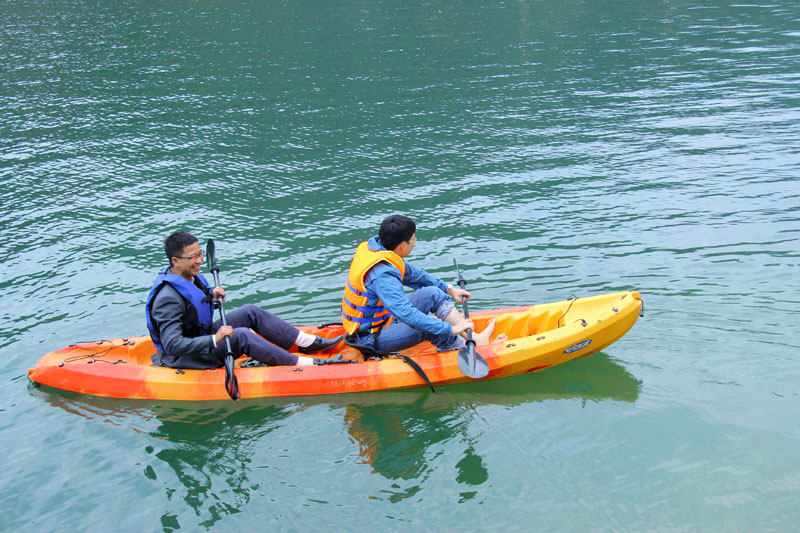
(HBO) – The Prime Minister on August 1 issued Decision No.1528/QD-TTg approving the master plan on developing the national Hoa Binh lake tourist area in the northern province of Hoa Binh until 2030.

Rowing on Hoa Binh lake in Da Bia village,
Tien Phong commune, Da Bac district
The province is devising specific plans to realise the master plan, which is
important to its tourism development, including rallying all possible resources
to fully tap potentials of Hoa Binh lake until 2025. As scheduled by 2030, the
area will boast synchronous and modern technical infrastructure and offer
high-quality and diverse tourist products, becoming the largest tourist area in
the province and one of the 12 key tourist areas in the northern mid-land and
mountainous region with cultural tours of the Muong ethnic group and the lake’s
ecological system as key products.
It plans to develop spiritual tours of Thac Bo temple in Cao Phong and Da Bac
district and Doi Co temple in Hien Luong commune, Da Bac district; build
quality resorts and ecological products on Sung island, Thien Phong commune, Da
Bac district; Ngoi Hoa bay in Ngoi Hoa commune, Tan Lac district;
community-based tourist products in Ngoi village in Ngoi Hoa commune, Tru
village in Thai Thinh commune, Ke village in Hien Luong commune, Da Bia village
in Tien Phong commune; as well as cultural tours in ethnic minority
communities.
Hoa Binh will continue tapping cruise tours from Tuan Chau tourist port in the
northern province of
Quang Ninh to Hoa Binh lake, and from Da Lake to Hoa Binh lake and hydropower
reservoirs in Son La, Dien Bien and Lai Chau provinces. Priority will be given
to home-stay services in community-based tourist villages and premier resort
services on nearly 1,000ha of Hoa Binh lake in Ngoi Hoa commune and Sung
island, 3-5 starred hotels in Thai Binh and Thai Thinh districts, and a
floating resort in Binh Thanh – Vay Nua – Hien Luong area, a food street and
cultural market along the two banks of the Da river, several stopovers with
artificial landscapes for visitors to take pictures, as well as signature
souvenirs.
It is encouraging businesses and investors to develop tourism by building and
upgrading cruise liners and using technological advances to develop competitive
tourist products.
Located just a 20-minute drive from Hoa Binh City, Ora Hill Farmstay & Glamping Hoa Binh is a captivating new destination nestled in Mo hamlet, Bình Thanh commune, Cao Phong district. Combining farming with leisure, this tranquil retreat is perfect for those seeking balance, joy, and an immersive experience in the expansive beauty of nature.
Muong Bi - Tan Lac is renowned as one of the four famous Muong regions in Hoa Binh province. Blessed by nature with a favourable climate and stunning landscapes, Tan Lac holds great advantages for tourism development. The local tourism industry has made remarkable strides in recent times thanks to the attention and support from the local authorities and sectors.
With its strategic location, well-developed transport network, and diverse soil and climatic conditions, Hoa Binh is emerging as a must-visit destination in Vietnam's northwestern tourism corridor. The province boasts numerous attractions, including the Kim Boi hot springs (Kim Boi district), the Dau Rong cave complex (Cao Phong), the Mai Chau valley (Mai Chau), and the iconic Hoa Binh hydropower plant.
The northern mountainous province of Hoa Binh has been listed among the 71 most beautiful places to visit worldwide by the prestigious US travel magazine Condé Nast Traveller.
Hoa Binh province’s rich natural and cultural resources position it as a prime location for developing community-based tourism (CBT). In recent years, support from central and provincial policies, as well as assistance from non-governmental organisations, have encouraged local ethnic minority and mountainous communities to actively engage in the sector.



